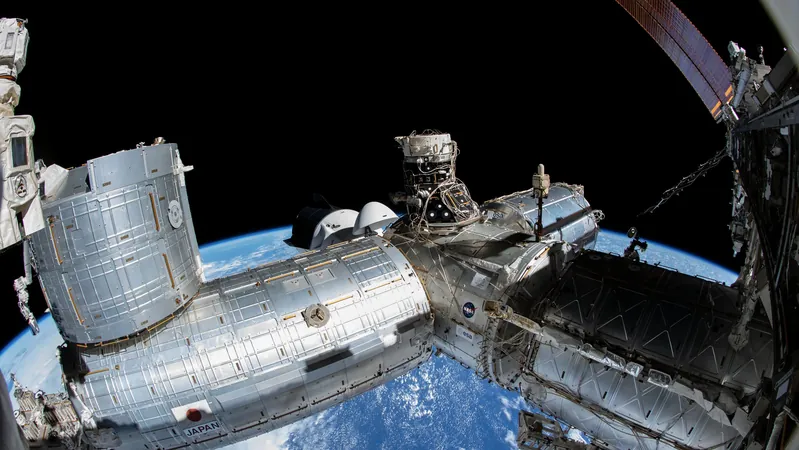
Space Station Evades Impending Collision with Dangerous Space Debris!
2024-11-21
Author: Mei
Space Station Evades Impending Collision with Dangerous Space Debris!
In a pivotal moment for space safety, the International Space Station (ISS) recently executed a critical maneuver to avoid a potentially catastrophic encounter with an incoming piece of space debris. On Tuesday afternoon, NASA confirmed that the ISS performed a maneuver by utilizing thrusters from a Russian cargo ship, the Progress 89, which had recently docked at the station.
The evasive action lasted for over five minutes and was strategically designed to increase the distance between the ISS and a fragment of debris from a defunct weather satellite. While NASA indicated the debris was not on a direct collision course, this precautionary measure provided an essential buffer, ensuring the safety of the station and its crew.
Space debris is an escalating concern in Earth's orbit, comprised largely of defunct satellites and remnants from previous space missions, including discarded rocket stages. Currently, NASA estimates that around 17.6 million pounds—equivalent to 8,800 tons—of various objects are cluttering low-Earth orbit, significantly heightening the risk for both crewed and uncrewed space missions.
The urgency surrounding debris avoidance has led to increased collaboration between space agencies. Following the detection of the approaching junk, NASA and Russia's space agency, Roscosmos, coordinated seamlessly to avert disaster. Without the executed maneuver, experts suggest the debris fragment could have approached within approximately 2.5 miles of the ISS.
This incident marks a growing trend of proactive measures taken by the space station team, as it has performed a total of 37 avoidance maneuvers since 1999, up from 32 as recently as December 2022. As space traffic intensifies, these evasive actions are becoming commonplace.
But the threat of space debris isn't confined to orbit; debris re-entering the atmosphere poses risks to life on Earth. Earlier this year, a family in Naples, Florida, claimed damages exceeding $80,000 after a chunk of space debris punched through their roof, highlighting the real-world consequences of orbital pollution.
Recognizing the urgency of the situation, global space agencies are increasingly committed to combating the proliferation of debris. In a groundbreaking initiative, the European Space Agency recently established a Zero Debris Charter, urging nations to commit to significantly reducing space junk by 2030.
However, not all news from the ISS has been smooth sailing. While NASA and Roscosmos worked collaboratively on this maneuver, they remain locked in a disagreement regarding an air leak in the Russian segment of the station. Officials have indicated that there is no common understanding of the leak's root cause or severity between U.S. and Russian teams, raising concerns within the international space community about the safety and integrity of the ISS.
As space exploration advances, the global community must continue to prioritize safety measures and international cooperation to ensure both the sustainability of space operations and the protection of lives on Earth. With mounting debris and complex challenges, the race to keep our astronauts safe is more crucial than ever!



 Brasil (PT)
Brasil (PT)
 Canada (EN)
Canada (EN)
 Chile (ES)
Chile (ES)
 España (ES)
España (ES)
 France (FR)
France (FR)
 Hong Kong (EN)
Hong Kong (EN)
 Italia (IT)
Italia (IT)
 日本 (JA)
日本 (JA)
 Magyarország (HU)
Magyarország (HU)
 Norge (NO)
Norge (NO)
 Polska (PL)
Polska (PL)
 Schweiz (DE)
Schweiz (DE)
 Singapore (EN)
Singapore (EN)
 Sverige (SV)
Sverige (SV)
 Suomi (FI)
Suomi (FI)
 Türkiye (TR)
Türkiye (TR)